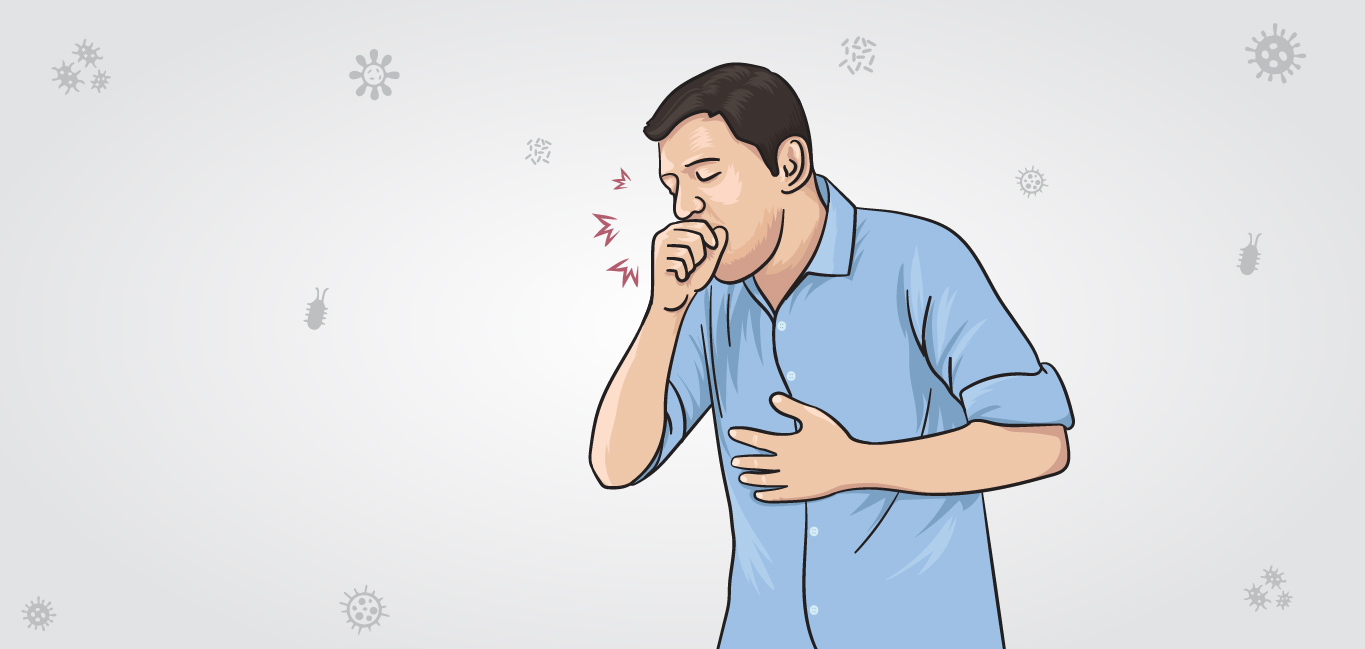
Pertussis, commonly known as whooping cough, is a serious bacterial infection of the lungs and airways. Highly contagious, it is characterised by long coughing spells that may last several months. It derives its name from the “whoop” sound that severely affected people make when taking quick breaths between coughing episodes.
Pertussis can cause serious health problems, especially in babies and young infants below six months. Although the vaccine is very effective, immunity fades after a few years. Pertussis can affect people of any age, but some people are at greater risk:
- Babies under 6 months
- People who have not been vaccinated against whooping cough
- Healthcare and childcare workers, and other vulnerable people who have not received a booster dose of the vaccine in the past 10 years
Symptoms
The incubation period (time from infection to first symptom) is about a week to ten days.
- The initial symptoms of whooping cough are similar to those of a common cold: runny nose, congestion, watery eyes, mild fever and sore throat.
- About a week or two after the onset of symptoms, those affected typically develop severe, violent, and uncontrolled coughing, often lasting weeks. These episodes may be accompanied by vomiting, breathing difficulties and fatigue.
- In babies, coughing may be absent, but they may have pauses in their breathing (apnea) and develop cyanosis (bluish discoloration of skin and nails) due to a lack of oxygen in the blood. Generally, babies and children who have been vaccinated do not show apnea and cyanosis.
Those who have been vaccinated experience only mild symptoms, such as coughing for a few days; and vomiting is rare. However, those unvaccinated can suffer from severe coughing fits, disrupting sleep and causing other complications.
Complications
- Babies who have not been fully vaccinated require hospitalisation.
- Apart from apnea, which is life-threatening, babies who are less than a year old could suffer from dehydration, pneumonia (serious lung infection), convulsions (uncontrolled shaking), encephalopathy (damage or disease of the brain) and rarely, death.
- Older people could develop complications like weight loss, nose bleeds, hernia, pneumonia, bruised ribs, or loss of bladder control.
It may take months for those with whooping cough to recover, and even if coughing fits have stopped, they may recur with other respiratory infections.
Causes
Whooping cough is caused by the bacteria Bordetella pertussis, which attach to the small, hair-like extensions called cilia in the cells of the respiratory passage, and release toxins that damage them, resulting in airway swelling.
- Bacteria spread through contaminated air and close contact. The infection spreads when an infected person coughs or sneezes, and the contaminated air is inhaled by others.
- The infection is contagious from the onset of symptoms until two weeks after the coughing begins.
- Those with mild symptoms but unaware they are infected, can spread the illness; babies are probably infected when they are handled by such people.
Diagnosis
A detailed medical history and information about close contact with an infected person are crucial to diagnose whooping cough.
Mucous samples from the nose or back of the throat, and blood tests can be used to confirm the diagnosis, in addition to symptoms and physical examination.
Treatment
A variety of antibiotics can be used to treat whooping cough; treatment should be started before the coughing fits begin to reduce the severity of the illness and make it less contagious.
A few precautions and measures can be taken at home for symptomatic relief –
- Getting plenty of rest, and staying away from others to prevent spread
- Covering the mouth and nose while coughing and sneezing. Children must be taught to wash hands often with soap and water
- Taking adequate fluids to prevent dehydration
- Taking mild painkillers like paracetamol or NSAIDs
- Taking smaller meals than normal to prevent vomiting
- Staying away from air pollutants like smoke, dust, and chemical fumes that can trigger coughing
The age of the infected person and duration of symptoms play a major role in the treatment plan for whooping cough.
Babies below six months of age, and adults with severe symptoms are typically hospitalised. They may require oxygen, removal of mucous from the respiratory passages, and intravenous fluids to prevent dehydration.
Vaccines offer the best protection for babies against whooping cough.
- The pertussis vaccine is given in combination with those for diphtheria and tetanus, at two, four, and six months, followed up with doses at 18 months and at five to six years.
- Pre-teens and teens should also receive a dose if the earlier schedule had not been complete.
- Unvaccinated adults should be given a dose, followed by a booster dose every 10 years.
- Pregnant women should be given the combination vaccine early in the third trimester of each pregnancy.
Sources:















